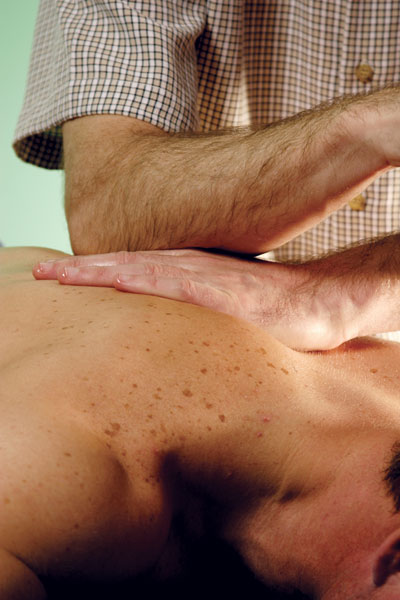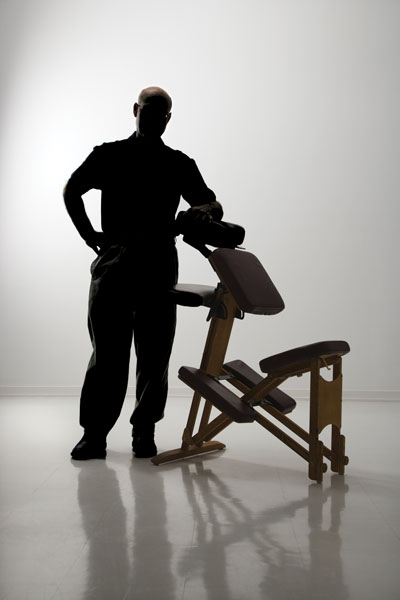
Features
Practice
Technique
Bodywork
At the end of Summer 2009, I experienced a nasty bike accident, which left my left elbow and wrist unusable for a period of time.
April 13, 2012 By Don Quinn Dillon
At the end of Summer 2009, I experienced a nasty bike accident, which left my left elbow and wrist unusable for a period of time. I also suffered injury to my right pelvis, left shin and right elbow, and accumulated various scratches on my “descent.” However, given my vocation, my primary goal was to rehab my arm as quickly as possible and get back to work. Day by challenging day, I got better, and returned to work an impressive six weeks later. However, left hip joint pain developed within a few months of the accident and progressed to the point where I was limping and experiencing pain when changing position.
 |
|
| We are bodyworkers as much for our own healing as for those we provide care for every day.
|
After an unsuccessful attempt to get an orthopedic physician to have a thorough look, I was encouraged by a lawyer to see a physiatrist in the area. I had heard stories of this physical medicine specialist from mutual patients over the years – they often recounted how unusual his approach was. I needed some medical record of the progression of my problem, so I went to see him.
I was somewhat familiar with Dr. Gerald Fulton, MD. I’d heard he was aged (72 years old and still practicing), afflicted with cerebral palsy and that he used unconventional treatment methods. Despite expecting the unordinary, I was not entirely prepared, though absolutely delighted, to meet him. He has a long white beard, and a head of hair just as long, and curious, piercing eyes with a wonderful twinkle. He had studied with a number of notable osteopathic practitioners over the years and was critical of conventional medical approaches and insurance compensation tactics.
After carefully lowering himself into the waiting room chair next to me, while supporting himself on the walls of his office, he nonchalantly asked me what was wrong. To build rapport, I stated we had mutual patients that spoke well of him. Since I am well-known in the area, I was sure he had heard my name…he looked up at the ceiling thoughtfully for a moment and then admitted he hadn’t. Further, he criticized my knowledge of anatomy when I described the anatomical location of my pain. And if my ego was still intact at this point, upon examination he asked me if I knew the range of motion of the ankle joint, or in fact any joint in the body.
Then, this 72-year-old physician with an obvious disability went to work on me and proceeded to show-and-tell me how my ankle and hip motion resembled that of a 70-year-old (I was 44). Demonstrating incredible strength, he twisted and stretched me, used contract-relax techniques, and with a soothing tone and childlike curiosity described how my pelvis was misaligned and that he could fix me. And he did…after a few days I was 40 to 50 per cent better.
My second visit revealed that I had made excellent progress, so Dr. Fulton sent me to see a highly skilled massage therapist, Marcel Mulholland, for further bodywork and requested that I return to tell him (i.e., Dr. Fulton) “what I’d learned.” Because, you see, this sage physiatrist, despite all his years of experience, was eager to learn more! He actually humbled himself to suggest that if I had been treated by his teachers, I would have been 90 per cent better by now.
The A-ha Moments
Heal thyself – not just a saying, my friend.
After some reflection, I recognized this was a mystical experience. Here I had stumbled across this wise old practitioner who many have thought of as odd because of his unconventional approach and his physical disability. Yet I saw only brilliance, curiosity and inherent qualities that I wish to emulate as I enter another two, three or more decades in my vocation. Empathizing with what must be painful ambulation for him – every step a chore – I saw his compassion and his brilliance shine through.
I also reflected on the oblivion I had been in – which was now obvious to me – with respect to my own physical problem. How could I have been so focused on my arm as to forget my badly injured pelvis, resulting in a throbbing, painful hip? I would have immediately caught this anomaly on one of my patients, yet missed it in myself. ”Physician, heal thyself” requires an acute awareness of one’s own prejudices, strengths and blind spots. I missed this one, big time.
I am reminded that I am a bodyworker as much for my own healing as for those I provide care for every day. Hopefully I won’t need another bike accident to drive that idea home.
The wisdom of posterity
I have been treated by many gifted practitioners who were very experienced. Guenther Froese, RMT, for one, just turned 80 years old and still works passionately week after week on his patients – and I’m fortunate to be one of them.
Because of them, even after 20 years of practice, my desire for learning is renewed, and I plan to seek out other masters who are willing to teach me. I encourage readers who are uninspired to look beyond their present circumstances and read the classics. Our experience is richer because of our elders, thanks to their wisdom. Seek them out and absorb their lessons.
Do unto others
Bodywork has helped me, but it has also helped those I love. My mother has experienced years of health problems. Back and neck pain from occupational posture, advanced osteoarthritis that precipitated two knee replacements (with bilateral shoulder surgeries in the plans), severe hallux
valgus in both feet, and more recently, treatment for cancer. The latter depleted her red blood cell count and electrolytes, wiping out her energy and landing her in the hospital for seven weeks.
 |
|
| Do not forget what a profound and important gift you bear when you provide bodywork.
|
I have provided bodywork for my mother throughout the years. With even the smallest intervention – a neck and shoulder massage while she sat in a wheelchair in her hospital room, or a simple foot rub to ease her sore feet – I have seen my mother’s face transform from reflecting anguish and fatigue to reflecting comfort and relief.
None of my interventions have been curative – the bodywork didn’t take away the osteoarthritis or the painful feet or the cancer – yet it helped her through her pain. She felt cared for, nurtured and comforted.
I felt relief as well. Instead of feeling powerless, unable to do anything to give my mother solace, I was able to alleviate some of her suffering. I feel blessed for my given talents, and it is these same talents that have eased the suffering of many others over my years in practice.
I encourage you not to forget what a profound and important gift you bear when you provide bodywork.
You really do make a difference.
(This article was adapted from Massage Therapist Practice, 2011.)
Don Dillon, RMT, is the author of Massage Therapist Practice: Start. Sustain. Succeed. and the self-study workbook Charting Skills for Massage Therapists. Don has lectured in seven Canadian provinces and over 60 of his articles have appeared in massage industry publications in Canada, the United States and Australia. Don is the recipient of several awards from the Ontario Massage Therapist Association, and is one of the founding members of Massage Therapy Radio www.massagetherapyradio.com. His website, www.MassageTherapistPractice.com, provides a variety of resources for massage therapists.
Print this page